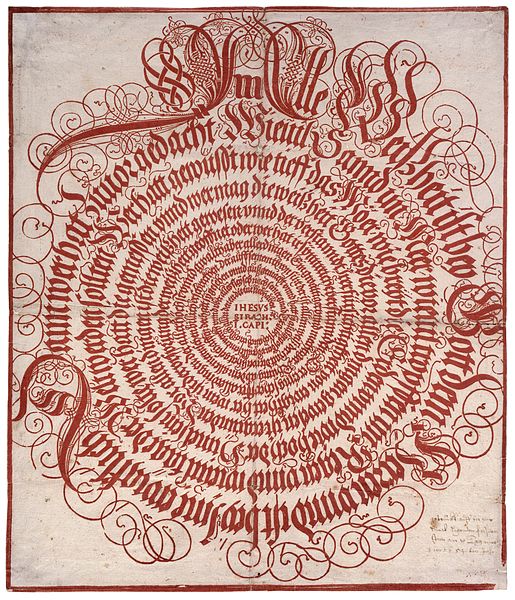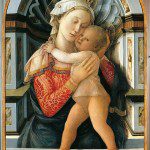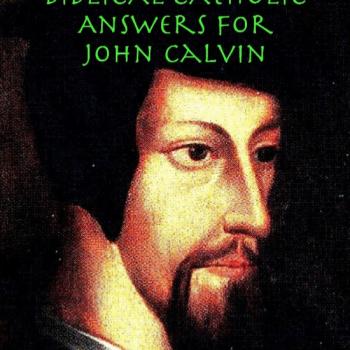(12-1-08)
* * *
John Calvin rejected the deuterocanonical books (also known by Protestants as “the apocrypha“) as part of Holy Scripture. See, for example: Antidote to the Council of Trent (Session Four), Institutes of the Christian Religion, Book I, Chapter 8, Section 10, Book III, Chapter 5, Section 8, and Book IV, Chapter 9, Section 14. His written record, however, is not without its inconsistencies when it comes to particular deuterocanonical books. Like his comrade-in-arms Martin Luther, he seems to be unable to restrain himself from self-contradiction. It’s a fascinating study. Let’s examine it a bit (all bolded emphases throughout are my own).
* * * * *
John Calvin, in three different works, calls Baruch a “prophet”, cites the book that bears his name, and cites him as an authority:
Would you know what the death of the soul is? It is to be without God — to be abandoned by God, and left to itself: for if God is its life, it loses its life when it loses the presence of God. That which has been said in general may be shown in particular parts. If without God, there are no rays to illumine our night, surely the soul, buried in its own darkness, is blind. It is also dumb, not being able to confess unto salvation what it has believed unto righteousness. It is deaf, not hearing that living voice. It is lame, nay, unable to support itself, having none to whom it can say, “Thou hast held my right hand, and conducted me in thy will.” In short, it performs no one function of life. For thus speaks the Prophet, when he would shew that the fountain of life is with God, (Baruch 3:14) — “Learn where there is prudence, where there is virtue, where there is understanding, where there is length of life and food, where there is light to the eyes and peace.”
What more do you require for death? But, not to stop here, let us consider with ourselves what life Christ hath brought us, and then we shall understand what the death is from which he hath redeemed us. We are taught both by the Apostle, when he says, “Awake, thou that sleepest, and arise from the dead, and Christ will give thee light.” (Ephesians 5:14.)
(Psychopannychia, 1536, in Selected Works of John Calvin: Tracts and Letters, Vol. 3, Tracts, Part 3, edited and translated by Henry Beveridge, Grand Rapids, Michigan: Baker Book House, 1983; pp. 454-455 [from Tracts, Vol. 3, Containing “Antidote to the Council of Trent” . . ., Edinburgh: Calvin Translation Society, 1851]; available online)
In the 66 books of the Bible that are accepted by Protestants, Baruch is never called a “prophet” (unless I missed it; I couldn’t find any example in doing a search for it) He is, rather, described as the prophet Jeremiah’s scribe or secretary (e.g., Jer 36:4-8,27,32). In fact, when Jeremiah and Baruch are mentioned together, the former is described as a prophet but the latter is not:
Jeremiah 43:6 . . . Jeremiah the prophet and Baruch the son of Neri’ah.
Jeremiah 45:1 The word that Jeremiah the prophet spoke to Baruch the son of Neri’ah, when he wrote these words in a book at the dictation of Jeremiah, . . .
Nevertheless, Calvin wants to call him a “prophet” and cite his book as an authoritative source, when refuting the false doctrine of soul sleep (an error that Luther, by the way, seems to have accepted in some form). This makes no sense if the book is not regarded as inspired Scripture. But then, many things in Calvin make little sense.
This view is plainly confirmed by a speech which occurs in the Book of Baruch, or at least the book which bears his name, — “Open thine eyes and see: for not the dead who are in hell, (infernus,) whose spirit has been torn from their bowels, will ascribe glory and justice to God; but the soul which, sad for the magnitude of the evil, walks bent and weak, and the failing eyes and the hungry soul will give glory.” (Baruch 2:17.) Here we undoubtedly see that, under the names of “dead” are included those who, afflicted and crushed by God, have gone away into destruction; and that the sad, bent, and weak soul, is that which, failing in its own strength, and having no confidence in itself, runs to the Lord, calls upon him, and from him expects assistance.
(Psychopannychia, ibid., p. 484; available online)
Though it is not clear whether it is merely a rhetorical argument or Calvin’s own opinion, he appeals to Baruch as a record of the prophet Jeremiah’s own words in this instance:
They seek some countenance from a passage in the Epistle which is said to have been written by Jeremiah to the Israelites, when in exile at Babylon. (Baruch 6:3.) As the Prophet, or whoever was the author of the Epistle, there advised the captive people that whenever they saw gods of silver and gold carried about on men’s shoulders, and the crowd standing round in stupid amazement, they should not imitate them in their stupor, but, worshipping in their heart, say, “Thee, O Lord, it behoves us to adore!” so our objectors maintain, that when they are present at the sacrilegious rites of the present age, they lift up their hearts to the Lord, and reflect that it is to Him their adoration belongs. As if the Prophet, when he called them to inward adoration of heart, did not intimate how perilous it would be to gratify the Babylonians by assuming features expressive of the worship of images. As every one sees that his only object was to urge his countrymen, seeing they had no power to check the public superstition of a nation under whose power and yoke they were living, privately to retain their religion unimpaired in their own minds, our worthy objectors have no ground for bringing him forward as the patron of their Idolatry!
Could they be induced to weigh their actions, even in the balance of the Prophet, they would easily see that in appealing to him they are ruining their cause.
(On Shunning the Unlawful Rites of the Ungodly, and Preserving the Purity of the Christian Religion, 1537, in Beveridge, ibid., pp. 403-404; available online)
Likewise, in the famous Institutes itself, Calvin calls Baruch a prophet and cites the “apocryphal” book with his name.
For it was most truly and piously written by the uncertain author (whoever he may have been) that wrote the book which is attributed to the prophet Baruch, “But the soul that is greatly vexed, which goeth stooping and feeble, and the eyes that fail, and the hungry soul, will give thee praise and righteousness, O Lord. Therefore, we do not make our humble supplication before thee, O Lord our God, for the righteousness of our fathers, and of our kings.” “Hear, O Lord, and have mercy; for thou art merciful: and have pity upon us, because we have sinned before thee,” (Baruch 2:18, 19; 3:2).
(Institutes of the Christian Religion, 1536 edition, Book III, Chapter 20, Section 8: “Of Prayer: A Perpetual Exercise of Faith. The Daily Benefits derived From It”; available online [Henry Beveridge translation of 1845: Edinburgh: Calvin Translation Society] )
In Calvin’s treatment of the doctrine of the soul, he cites both Sirach (Ecclesiasticus) and Wisdom as “sacred writers” and “pious writers” who, though not “canonical,” “ought to have some weight”:
When he enjoins us to “put on the new man, which is renewed in knowledge after the image of him who created him,” he clearly shows what this image is, or wherein it consists; as he also does when he says, ( Ephesians 4:24,) “Put on the new man, who has been created after God in knowledge and true holiness.” When we would comprehend all these things, in one word we say, that man, in respect of spirit, was made partaker of the wisdom, justice, and goodness of God. This mode of expression was followed by two sacred writers. The one, in dividing man into two parts — body, taken from the earth, and soul, derived from the image of God — briefly comprehended what Moses had more fully expressed, (Ecclesiasticus 17:1.) “God created man, and made him after his own image.” The other, desiring to state exegetically how far the image of God extended, called man “inexterminable,” because created in the image of God. (Wisdom 2:23.) I would not urge the authority of these writers strongly on our opponents, did they not allege them against us. Still they ought to have some weight, if not as canonical, at least as ancient pious writers strongly supported.
(Psychopannychia, ibid., 424; available online)
[the online version absurdly lists the Ecclesiasticus passage as “Ecclesiastes 17:1” — the problem — besides the misquotation itself –, is that Ecclesiastes has only twelve chapters. In the Beveridge translation of 1851 (I have the hard copy of the book before me as I write), it is listed as “Ecclus. xvii. 1”. Interestingly, in the Index (p. 499), this citation is omitted, while it states: “one of the books of the Apocrypha, attempts of the Popish Church to support their doctrines from, 68, 129; not inspired, 70.” One would never know of Calvin’s qualified support of the book and argument made from it, which appears on p. 424. The “Wisdom of Solomon” entry in the Index, on the other hand, provides a reference to p. 424]
Calvin also calls the author of Ecclesiasticus, or Sirach, a “prophet”:
Almost similar to this [Ps 103:13] is the passage in Ecclesiasticus, “The number of the years of man, as much as a hundred years, have been counted as the drop of water in the sea, and as the sand on the sea shore; but they are few compared with the whole duration of time. Therefore God is patient towards them, and sheds out his mercy upon them.” (Ecclesiasticus 18:8- 10.) Here they must admit that the prophet’s sentiment was very different; from that which they dream, and means that the Lord pitied those whom he knew to stand by his mercy alone, and, who, were he for a little to withdraw his hand, would return to the dust whence they were taken. Thereafter he subjoins a brief description of human life, comparing it to a flower which, though it blooms today, will be nothing more than dead herbage tomorrow.
Had he even declared that the spirit of man perishes and comes to nothing, he would not have given any defence to their error. For when we say that the spirit of man is immortal, we do not affirm that it can stand against the hand of God, or subsist without his agency. Far from us be such blasphemy! But we say that it is sustained by his hand and blessing.
(Psychopannychia, ibid., pp. 477-478; available online)
[Again, the Beveridge translation from 1851, oddly neglects to mention this citation in its General Index. Surely an innocent oversight . . .]
Three paragraphs later, Calvin cites Wisdom as having some degree of authority for determining spiritual truth:
What! they ask, if they have been cut off from the energy of God, if they have fallen away from his care and remembrance, have they not ceased to be? As if I had it not in my power to retort. What! if they have been cut off from the energy of God, if they have escaped his remembrance, how will they ever again be? And when will the Resurrection be? Again, how do the things agree? “The souls of the just are in the hands of God,” (Wisdom 3:1;) or, to quote only from the sure oracles of God, “The just will be in eternal remembrance.” (Psalm 112:6.)
(Ibid., pp. 478-479; available online)
Calvin again cites Ecclesiasticus, but denies (contrary to an earlier section) that the writer was a prophet:
This is not inelegantly stated by Ecclesiasticus when he says, (Ecclesiasticus 37:28) “The life of a man is in the number of his days, but the days of Israel are innumerable.” But as the authority of that writer is doubtful, let us leave him, and listen to a prophet, admirably teaching the same thing, in his own words, (Psalm 102:24,)
(Ibid., p. 489; available online)
So the writer of Ecclesiastes is a prophet, but then he isn’t, and the authority of a prophet (the writer of Psalm 102) is cited over against him. In other words, the implication is that the “prophet” has biblical, inspired authority. But then Calvin had referred to Baruch as a “prophet” too, in no less than three different works, as we saw above (therefore, his authority would seem, by analogy, to be equal or similar to that of the canonical Psalm writer). Thus, there is no end of vicious internal contradiction.
At least one example of deuterocanonical citation is absent from Beveridge or from the electronic version drawn from him (and hence the online search engine for same). One can find it in the “Biblical References” Index (Vol. II, p. 1568) of the 1960 edition of the Institutes (edited by John T. McNeill; translated and indexed by Ford Lewis Battles; Philadelphia: Westminster Press). From Book III, Chapter 9, Section 6 (“The comfort prepared for believers by aspiration for the life to come”):
For before their eyes will be that day when the Lord will receive his faithful people into the peace of his Kingdom, “will wipe away every tear from their eyes” [Rev 7:17; cf. Isa. 25:8], will clothe them with “a robe of glory . . . and rejoicing” [Ecclus. 6:31, EV] . . .
(Vol. II, p. 718)
Beveridge has similar words, but not as a quotation, and either Beveridge or the electronic version neglects to give a citation, so that it becomes a textual issue of whether Calvin was deliberately citing the book:
They will turn their eye to that day (Isaiah 25:8; Rev. 7:17), on which the Lord will receive his faithful servants, wipe away all tears from their eyes, clothe them in a robe of glory and joy, feed them with the ineffable sweetness of his pleasures, exalt them to share with him in his greatness; in fine, admit them to a participation in his happiness.
(see the online version)
Here is the deuterocanonical passage that the Battles edition believes Calvin to be quoting, and making part of his argument, reads, in its RSV version:
You will wear her like a glorious robe, and put her on like a crown of gladness.
Calvin cites the Book of Wisdom in his Institutes, as well:
8. In regard to the origin of idols, the statement contained in the Book of Wisdom has been received with almost universal consent—viz. that they originated with those who bestowed this honour on the dead, from a superstitious regard to their memory. I admit that this perverse practice is of very high antiquity, and I deny not that it was a kind of torch by which the infatuated proneness of mankind to idolatry was kindled into a greater blaze. I do not, however, admit that it was the first origin of the practice. That idols were in use before the prevalence of that ambitious consecration of the images of the dead, frequently adverted to by profane writers, is evident from the words of Moses (Gen. 31:19). When he relates that Rachel stole her father’s images, he speaks of the use of idols as a common vice. Hence we may infer, that the human mind is, so to speak, a perpetual forge of idols. There was a kind of renewal of the world at the deluge, but before many years elapse, men are forging gods at will.
(Book I, Chapter 10, Section 8; available online; passage indicated in Battles edition as 14:15-16: “. . . he now honored as a god what was once a dead human being . . .” [RSV]; cf. passing reference to the angel Raphael in Tobit 12:15: Inst., I, 14, 8)














